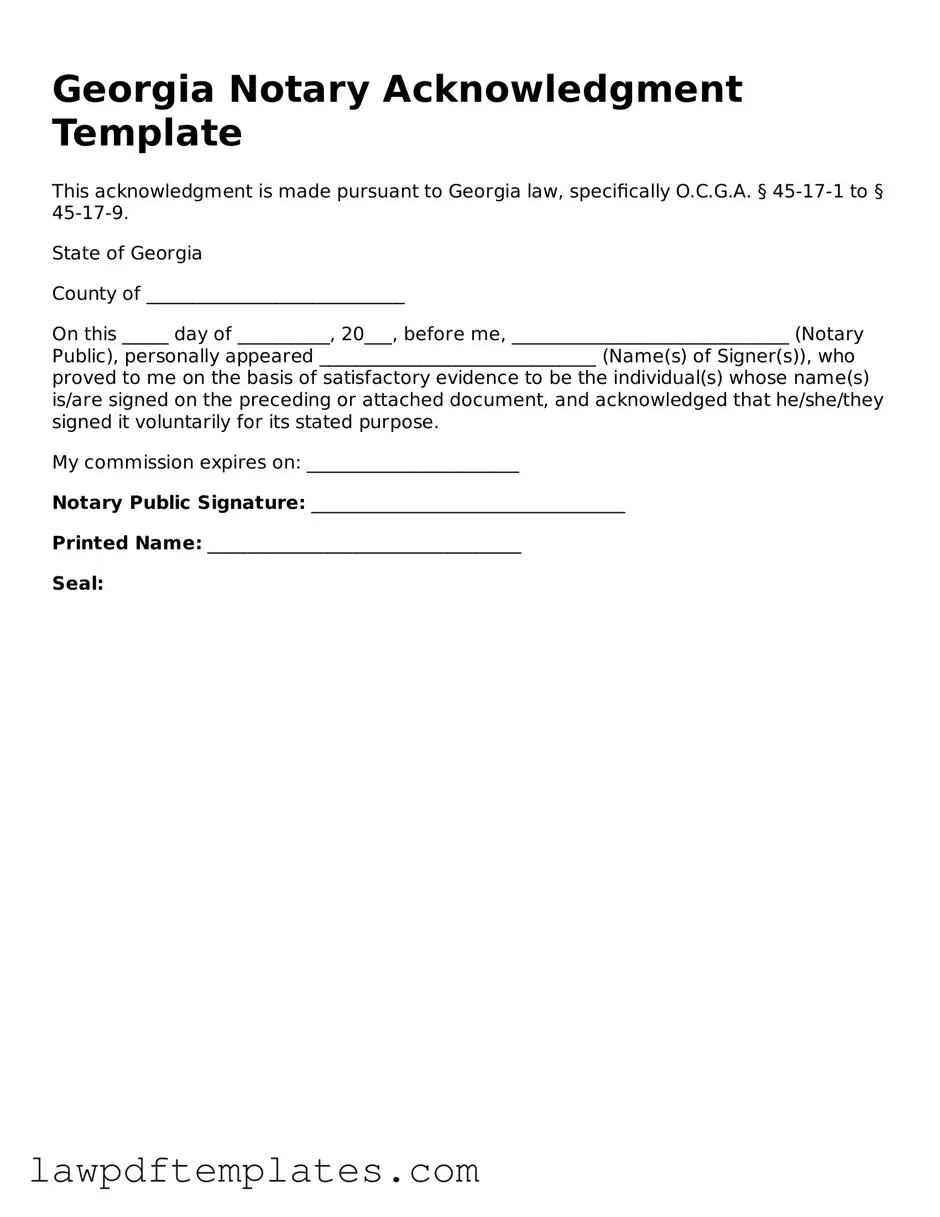Free Notary Acknowledgement Template for the State of Georgia
Form Breakdown
| Fact Name | Details |
|---|---|
| Purpose | The Georgia Notary Acknowledgement form is used to verify the identity of a signer and confirm their willingness to sign a document. |
| Governing Law | This form is governed by the Official Code of Georgia Annotated (O.C.G.A.) § 45-17-1 et seq. |
| Signers | Any individual who is signing a legal document can use the notary acknowledgement form, provided they are present before the notary. |
| Notary Requirements | The notary must be a commissioned notary public in Georgia and must witness the signing of the document. |
| Signature Date | The date of signing must be included on the form, indicating when the acknowledgement occurred. |
| Record Keeping | Notaries are required to keep a record of all acknowledgements in their notary journal. |
| Language | The form can be completed in English or another language, but must accurately reflect the intent of the signer. |
| Validity | A properly executed notary acknowledgement is generally valid throughout the state of Georgia, as long as it complies with state laws. |
Sample - Georgia Notary Acknowledgement Form
Georgia Notary Acknowledgment Template
This acknowledgment is made pursuant to Georgia law, specifically O.C.G.A. § 45-17-1 to § 45-17-9.
State of Georgia
County of ____________________________
On this _____ day of __________, 20___, before me, ______________________________ (Notary Public), personally appeared ______________________________ (Name(s) of Signer(s)), who proved to me on the basis of satisfactory evidence to be the individual(s) whose name(s) is/are signed on the preceding or attached document, and acknowledged that he/she/they signed it voluntarily for its stated purpose.
My commission expires on: _______________________
Notary Public Signature: __________________________________
Printed Name: __________________________________
Seal:
Common mistakes
When individuals fill out the Georgia Notary Acknowledgement form, several common mistakes can lead to complications or even invalidate the document. One frequent error is failing to include the correct date of the acknowledgment. The date is crucial as it signifies when the notary witnessed the signing. Omitting this detail or writing an incorrect date can create confusion about the timing of the notarization.
Another common mistake is neglecting to provide the proper identification of the signer. The form requires that the notary clearly identifies the individual signing the document. If the notary does not include the signer's name as it appears on their identification, the acknowledgment may not hold up under scrutiny. This oversight can undermine the integrity of the notarization process.
Additionally, some individuals mistakenly believe that a signature is sufficient for a valid acknowledgment. In reality, the notary must also sign the form. This signature serves as a verification of the act performed. Without it, the acknowledgment lacks the necessary authentication, rendering the document potentially ineffective.
Another frequent oversight involves the notary's seal. In Georgia, the notary is required to affix their official seal to the acknowledgment form. Failing to do so, or using an outdated or illegible seal, can lead to questions about the document's validity. The seal serves as an essential element of the notarization process, providing a layer of security and assurance.
Lastly, many people overlook the requirement for the notary to include their commission expiration date. This date informs the public of the notary's authority to perform notarizations. If this information is missing, it can raise doubts about the legitimacy of the acknowledgment. Ensuring that all necessary details are present is vital for the form to serve its intended purpose.
Discover More Notary Acknowledgement Templates for Specific States
Ca Acknowledgement Form 2023 - The presence of a Notary Acknowledgment can reduce the chance of legal challenges against an agreement or transaction.
For those seeking to better understand legal documentation, the Georgia Power of Attorney form serves as a crucial step in establishing authority. By utilizing this form, individuals can ensure that their designated agent can act decisively in their absence. This is particularly beneficial for anyone wanting to secure their affairs and make informed choices during challenging times. To learn more about this process, consider reviewing a detailed overview of the Power of Attorney guidelines.
Florida Notary Statement - A signed Notary Acknowledgement can be used as evidence in court.
